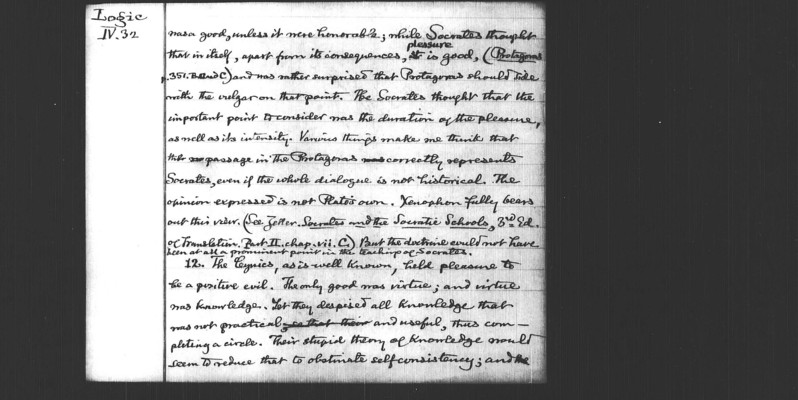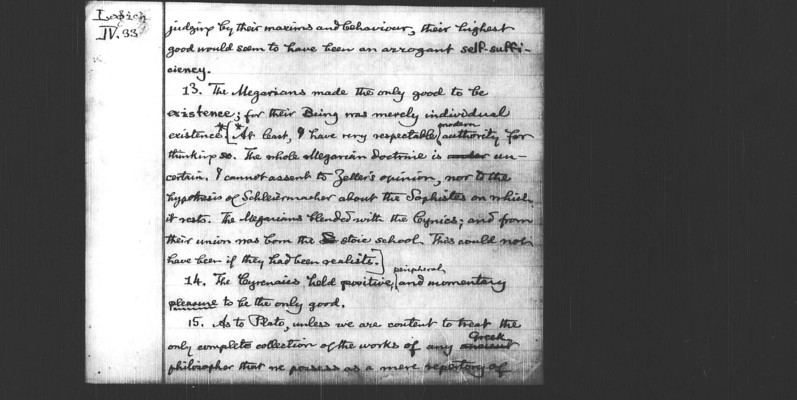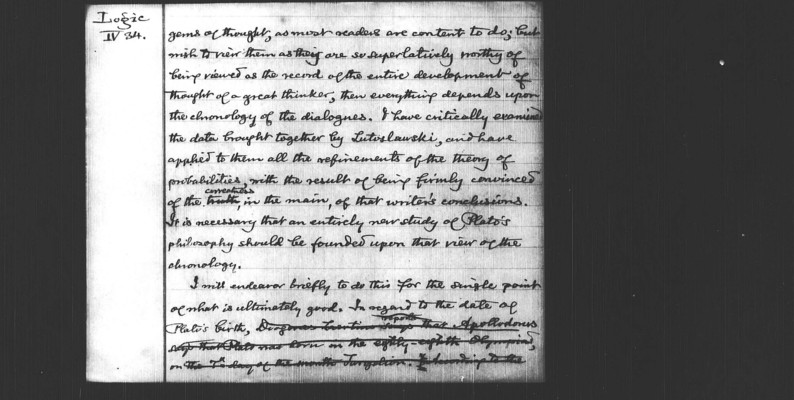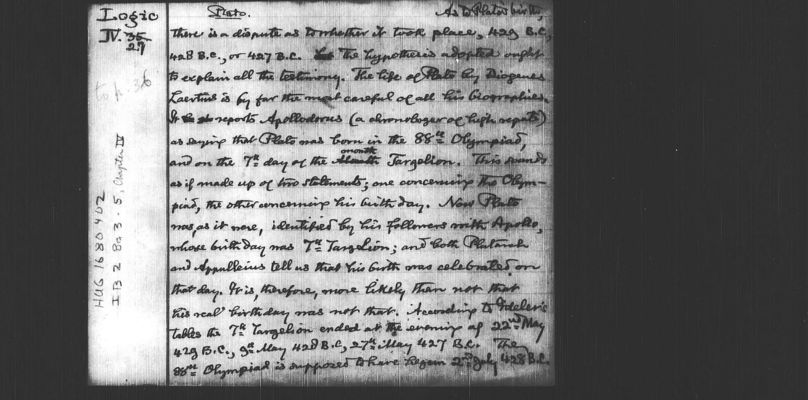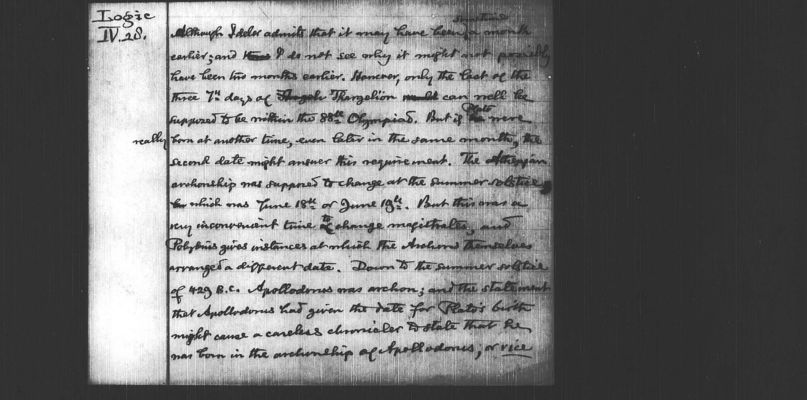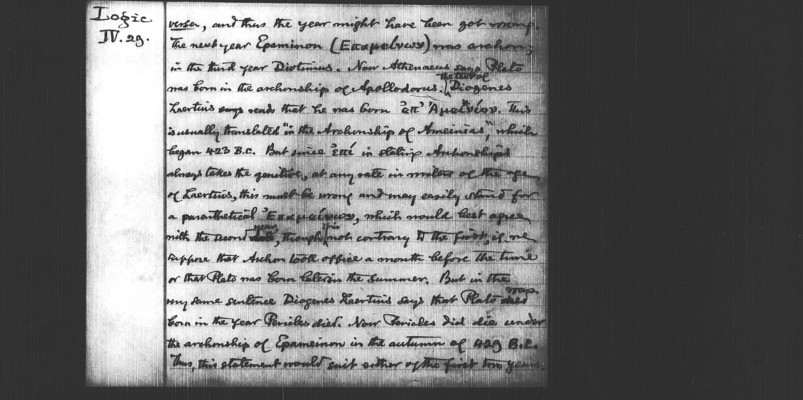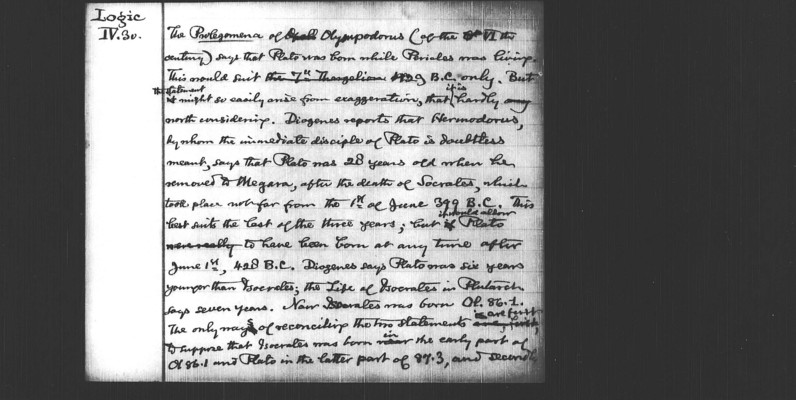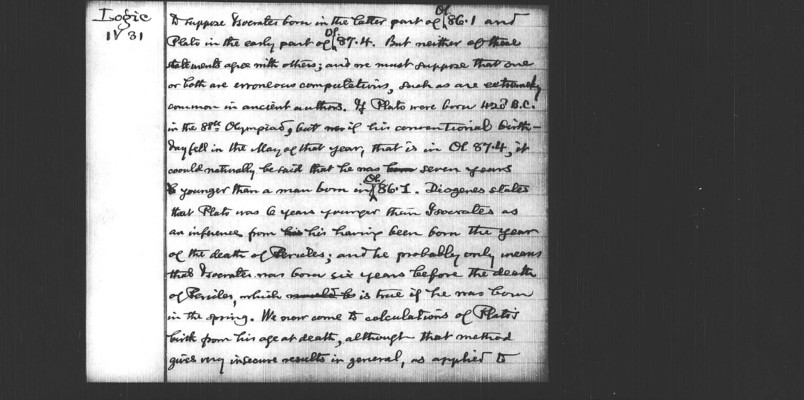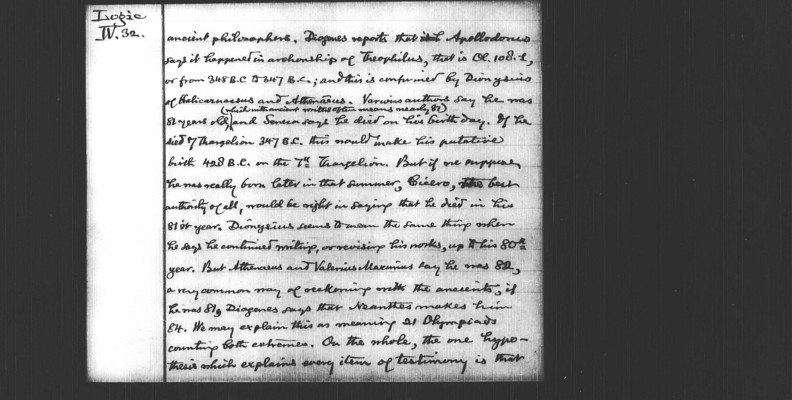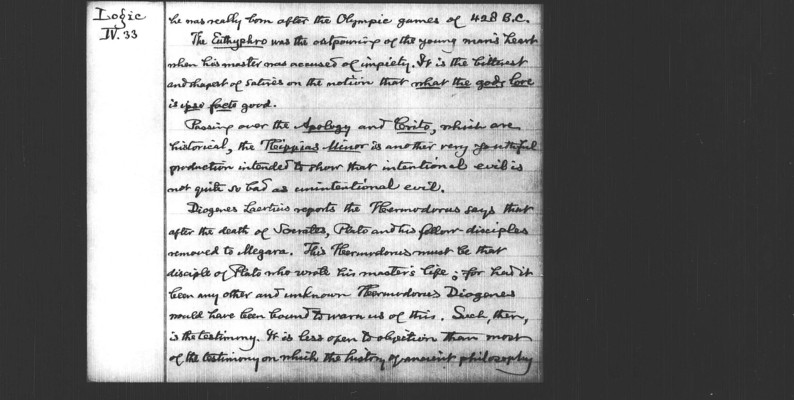Pages That Need Review
MS 434 (1902) - Minute Logic - Chapter IV
21
Logic IV. 32 was a good unless it were honorable while Socrates thought that in itself apart from its consequences pleasure is good (Protagoras p. 351, B and C) and was rather surprised that Protagoras should side with the [relgar?] on that point. He Socrates thought that the important point to consider was the duration of the pleasuer as well as its intensity. Various things make me think that this passage in the Protagoras correctly represents Socrates, even if the whole dialogue is not historical. The opinion expressed is not Plato's own. Xenophon fully bears out this view. (See Zeffler. Socrates and the Socratic Schools 3rd Ed of Translation. Part II Chap. vii C) But the doctrine could not have been at all a prominent point in the teachings of Socrates. 12. The [Cynics?] as is well known held pleasure to be a positive evil. The only good was virtue and virtue was knowledge. Yet they despised all knowledge that was not practical and useful thus completing a circle. Their stupic theory of knowledge would seem to reduce that to obstinate self-consistency and
22
Logic IV. 33 judging by their maxims and behavious their highest good would seem to have been an arrogant self-sufficiency. 13. The Megarians made the only good to be existence for their being was merely individual existence. At least I have very respectable modern authority for thinking so. The whole allegarian doctrine is uncertain. I cannot assert to Zeller's opinion nor the hypotheses of Schleiermasher about the Sophistes on which it rests. The Megarians blended with the Cynics and from their union was born the stoic school. This could not have been if they had been realists. 14. The Cyrenaics held positive peripheral and momentary pleasure to be the only good. 15. As to Plato unless we are content to [hear?] the only complete collection of the works of any Greek philosopher that we possess as a mere repertory of
23
Logic IV 34. gems of thought as most readers are content to do but wish to view them as they are so superlatively worthy of being viewed as the record of the entire development of thoguht of a great thinker, then everything depends upon the chronology of the dialogues. I have critically examined the data brought together by [Lutoslauski?] and have applied to them all the refinements of the theory of probabilities with the results of being firmly convinced of the correctness in the main of that writers conclusions. It is necessary that an entirely new study of Plato's philosophy should be founded upon that view of the chronology. I will endeavor briefly to do this for the single point of what is ultimately good. In regard to the date of Plato's birth,
24
Logic IV 27 Plato. As to Plato's birth There is a dispute as to whether it took place 429 BC, 428 BC or 427BC. The hypothesis adopted ought to explain all the testimony. The life of Plato by Diogenes Laevtius is by far the most careful of all his biographies. It reports Apollodorus (a chronologer of high repute) as saying that Plato was born in the 88 Olympiad and onthe 7th day of the month Targelion. This sounds as if made up of two statements, one concerning the Olypiad, the other concerning his birth day. Now Plato was as it were identified by his followers with Apollo whose birth day was 7th Targelion and both [Platarch?] and Appulleius tell us that his birth was celebrated on that day. It is therefore more likely than not that his real birthday as not that. According to [Ideler's?] tables the 7th Targelion ended at the evening of 22nd May 429 BC, 9th May 428 BC, May 427 BC. The 88th Olympiad is support to have begun 2nd July 428 BC
25
Logic IV 28.Although Idelar admits that it may have been sometime a month earlier and I do not see why it might not possibly have been two months earlier. However only the last of the three 7th days of Thargelion can well be supposed to be within the 88th Olypiad. But if Plate were really born at another time even later in the same month the second date might answer this requirement. The [Athenian?] [ovohonship?] was supposed to change at the summer solstice which was June 18th or June 19th. But this was a very inconvenient time to change magistrates and [Poly?] gives instances at which the Archons themselves arranged a different date. Down to the summer solstice of 429 BC. Apollodorus was archon and the statements that Apollodorus had given the date for Plato's birth might cause a careless chronicler to state that he was born inthe archonship of Apollodorus or vice
26
Logic IV 29 versa and thus the year might have been [got?] [wrong?] The next year Epaminon [foreign language] was archon in the third year Diotimus. Now Athenaeus says Plato was born in the archonship of Apollodorus. The test of diogenes Laortius read that he was born [foreign text]. This is usually translated "in the Archonship of Ameinias" which began 423 BC. But since [foreign text] in stating Archonships always takes the genitive at any rate in [writers] of the age of Laertius this must be wrong and may easily stand for a parenthetical [foreign text] which would best agree with the second year though it is not contrary to the first if we suppose that Archon took office a month before the time of that Plato was born later in the year Pericles died. Now Pericles did die under the archonship of Epameinon in the autumn of 429 BC. This this statement would suit either of the first two years.
27
Logic IV. 30. The Prolegomena of Olympodorus (of the VI century) says that Plato was born while Pericles was living. This would suit 429 BC only. But the statement might be so easily arise from the exxageration that it is hardly worth considering. Diogenes reports that Hermodorus by whom the immediate disciple of Plato is doubtless [means?] says that Plato was 28 years old when he removed to Megara after the death of Socrates which took place not far from the 1st of Jeene 399 BC. This best suits the last of the three years but it wold allow to have been borm at any time after June 1st 428 BC. Diogenes says Plato was six years younger than Socrates, the Ife of Socrates in [Plutarch?] say seven years. Now Socrates was born of 86.1. The only way of reconciling the two statements are first to suppose that 1 socrates was born in the early part of ol. 86.1 and Plato in the later part of 87.3 and secondly
28
Logic IV 31 to suppose Socrates born in the latter part of ol. 86.1 and Plato in the early part of ol. 87.4. But neither of those statements agree with others and we must suppose that one or both are erroneous computations such as are extremely common in ancient authors. If Plato were born 420 BC in the 88th Olympiad but if his conventional birth day fell in the May of that year that is in Ol. 87.4 it could nationally be said that he was seven years younger than a man born in Ol. 86.1. Diogenes states that Plato was 6 years younger than Isocrates as an influence from is having been born the year of the death of Pericles and he probably only means that Socrates was born six years before the death of Pericles which is true if he was born in the spring. We now come to calculations of Plato's birth from his age af death although that method give very insecure results in general as applied to
29
Logic IV 32. ancient philosophers. Diogenes reports that Apollodorus says it happened in the archonship of Theophilus that is Ol. 108.1 or from 348 BC to 347 BC and this is confirmed by Dionysius of Halicaruasus and Athenaeus. Various authors say he was 81 years old which with ancient writes often means nearly 87 and Seneca says he died on his birthday. If he died 7 Thangelion 347 BC this would make his putative birth 428 BC on the 7th Thangelion. But if we suppose he was really born later in that summer Cicero the best authority of all would be right in saying that he died in his 81st year. Dionysius seems to mean the same thing when he says he continued writings or revising his works up to his 80th year. But Athenaeus and Velerius Maximus say he was 82 a very common way of reckoning with the ancients if he was 81 Diagenes say that [Neanthes?] makes him 84. We may explain this as meaning 21 Olympiads counting both extremes. On the whole the one hypothesis which explains every item of testimony is that
30
Logic IV 33. he was really born after the Olympic games of 428 BC. The Euthyphro was the outpouring of the young mans heart when his master was accused of impiety. It is the bitterest and shapest of satives on the notion that what the gods love is ipso facto good. Passing over the Apology and Crito which are historical the Heippias Minor is another very youthful production intended to show that intentional evil is not quite so bad as unintentional evil. Diogenes Laetius reports the Hermodorus sayd that after the death of Socrates, Plato and his fellow disciples removed to Megara. This Hermudorus must be that disciple of Plato who wrote his master's life for had it been my other and unknown Hermadorus Diogenes would have been bound to warn us of this. Such then is the testimony. It is less open to objection than most of the testimony on which the history of ancient philosophy.
